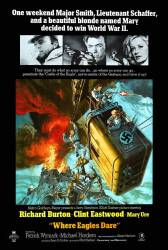Factual error: When General Rosemeyer steps out of the helicopter in the courtyard, he salutes Colonel Kramer. Colonel Kramer then returns the salute. A senior officer would never salute a more junior officer first. (00:28:25)
Factual error: The Germans in the castle are using Bell 47 helicopters which a) were American, not German, and b) weren't even in operation until 1946.
Factual error: The aircraft at the Oberhausen airfield at the end of the field are T-6 texan trainers of the Austrian air-force painted with Luftwaffe markings.
Factual error: In the flashback scene where the commandos are being briefed on their mission, they are told that General Carmody was on his way to a meeting with Russian officers on Crete. Hardly the best place for a meeting between the Allies since Crete was then under German occupation.
Factual error: As the coach moves through the village near the end of the film, it drives past a tracked vehicle. The vehicle is a Hotchkiss LPz, a type of armoured personnel carrier not produced until the 1960s.
Factual error: When Lt. Schaffer is sneaking up on the German soldier, in the radio room in the castle, you see and hear the soldier changing radio station channels. Most of the music you hear playing on the radio is distinctly a 1960s style easy listening music and not 1940s music.
Factual error: Smith has the books with names in his pocket when he goes into the water, jumping from the cable car. When he shows the books to Turner, they are in perfect shape. They should have been waterlogged or at least showed some sign of water damage.
Factual error: Schaffer and Smith are captured and the Nazis are taking them away in a car. After some fighting, the car crashes. While the Nazis fly through the vehicle's windshield, our heroes sit like they had seatbelts, which they didn't.
Factual error: Near the end the Germans have to blow a tree in two pieces but the snow on the road is still there, not affected by the blast. And later when the first Kübelwagen is passing the gap for the chase there are already tracks from other takes.
Factual error: The Mosquito couldn't carry passengers. It has only seats for the pilot and navigator. And why was it flying over Nazi Germany with an American general on board?
Factual error: Most of the soldiers (both German, British and American) sport 1960's style haircuts. Regulations in all three armies call for buzzcuts. Eastwood sports almost a pompadour, and Burton almost a mullet. This is a mistake made in about 50% of war movies.
Factual error: A number of the German uniforms in this film are incorrect for this period and location. The reversible white/camouflage parkas worn by the allies were scarcely seen beyond the eastern front before D-Day and would have looked very suspicious without the matching over-pants. Additionally, the marsh pattern camouflage on these didn't appear on these until mid 1944, which only partially replaced the Heer splinter patterns, SS camo patterns, as well as blue and olive solids. Finally, the stereotypical black SS uniforms seen in the film were largely replaced with an olive green version of similar cut nearly 10 years before the film was set. In 1943-44, it was only worn by Himmler (who also wore the olive version), his staff, very highly placed members of SS related organizations, some of Hitler's bodyguard detachment, and native security forces on the eastern front (hiwi's).






Answer: When the guard comes in, Burton explains what's going on. Also he is dressed as a German officer so his explanation and actions are plausible.